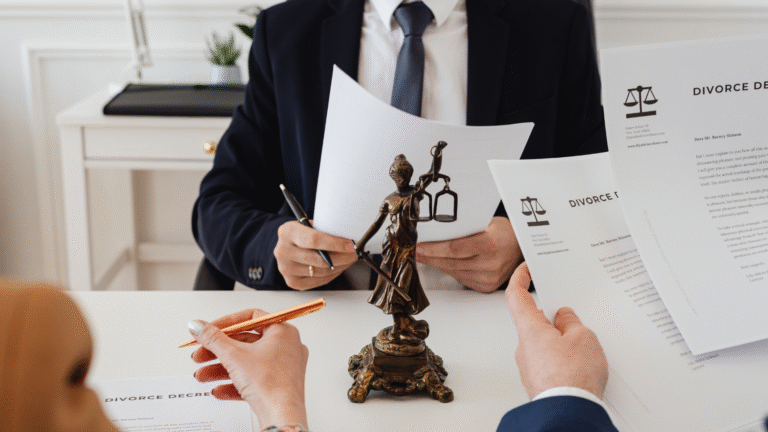When you’ve been injured due to someone else’s negligence, finding the right legal representation can make or break your case. Choosing a personal injury lawyer isn’t a decision to take lightly, as this professional will be your advocate throughout what can be a lengthy and complex legal process. The attorney you select will handle everything from initial case evaluation to potentially representing you in court, making their expertise and experience critical to your success.
Understanding what questions to ask during your initial consultation can help you make an informed decision and ensure you’re working with someone who truly has your best interests at heart. The right legal advocate can mean the difference between a fair settlement and walking away empty-handed.

1. What Experience Do You Have with Cases Like Mine?
The first question you should ask any potential attorney is about their specific experience with cases similar to yours. Not all personal injury cases are the same, and you want someone who understands the nuances of your particular situation. Whether you’ve been in a car accident, suffered a slip and fall, or experienced medical malpractice, each type of case requires different knowledge and expertise.
An experienced personal injury trial attorney will be able to discuss previous cases they’ve handled that are similar to yours. They should be able to explain the challenges they encountered and how they overcame them. This conversation will give you insight into their problem-solving abilities and their familiarity with the specific laws and regulations that apply to your case.
Don’t be satisfied with vague answers about general experience. Ask for specific details: How many cases like yours have they handled? What were the outcomes? This information will help you gauge whether they have the depth of experience needed to handle your case effectively.
2. Are You a Trial Attorney or Do You Only Handle Settlements?
Many people don’t realize there’s a significant difference between personal injury lawyers who primarily handle settlements and those who regularly go to trial. While most personal injury cases do settle out of court, you want to ensure your personal injury lawyer is prepared to take your case to trial if necessary.
How personal injury cases go to trial can be complex, and having a personal injury lawyer who understands this process is crucial. Insurance companies are more likely to offer fair settlements when they know your personal injury lawyer isn’t afraid of the courtroom. A top-rated personal injury lawyer with trial experience brings leverage to negotiations that settlement-only lawyers simply don’t have.
Ask your potential personal injury lawyer about their trial experience. How many cases have they taken to trial in the past year? What percentage of their cases go to trial versus settling out of court? Their answers will help you understand their approach and whether they’re prepared to fight for you in court if needed.
3. What Is Your Success Rate and Track Record?
While past results don’t guarantee future outcomes, an attorney’s track record can provide valuable insight into their effectiveness. A skilled legal professional should be able to discuss their success rate and provide examples of favorable outcomes they’ve achieved for clients.
However, be wary of attorneys who make unrealistic promises or guarantee specific results. The personal injury court process explained by honest attorneys will include discussions about potential challenges and realistic expectations. No ethical attorney can guarantee a specific outcome, as every case depends on unique circumstances and evidence.
Look for attorneys who can demonstrate consistent success across various types of cases. They should be able to explain their approach to case preparation and how they work to maximize their clients’ compensation.
4. How Do You Handle Communication with Clients?
Effective communication is essential throughout the legal process. You’ll want to know how often you can expect updates on your case and what method of communication your attorney prefers. Some attorneys are more accessible than others, and it’s important to find someone whose communication style matches your needs.
Ask about response times for emails and phone calls. Will you be working directly with the attorney, or will most communication go through support staff? While paralegals and assistants can be valuable team members, you should have reasonable access to your actual attorney when needed.
Understanding the communication process upfront can prevent frustration later. Make sure you’re comfortable with their approach before moving forward.
5. What Are Your Fees and How Are They Structured?
Understanding the fee structure is crucial before hiring any attorney. Most personal injury attorneys work on a contingency fee basis, meaning they only get paid if you win your case. However, the percentage they take can vary, and there may be additional costs you’re responsible for regardless of the outcome.
When searching for affordable personal injury attorney services, don’t just focus on the lowest percentage. Consider the attorney’s experience, success rate, and the level of service they provide. A more experienced attorney who charges a slightly higher percentage might result in a larger net settlement for you.
Ask about all potential costs, including court filing fees, expert witness fees, and other expenses. Some attorneys advance these costs and deduct them from your settlement, while others may require you to pay them upfront.
6. Do I Need a Personal Injury Advocate for Trial?
This question helps clarify the difference between various types of legal professionals and their roles. Understanding when to hire a personal injury lawyer or attorney versus other types of legal professionals is important for your case’s success.
The terms “attorney” and “advocate” are often used interchangeably, but it’s worth discussing the personal injury lawyer vs attorney difference with your potential legal representative. Some professionals focus more on advocacy and negotiation, while others have extensive courtroom experience.
Your attorney should be able to explain their role clearly and help you understand what level of representation you need based on your specific circumstances.
7. How Long Do You Expect My Case to Take?
The court timeline for personal injury case resolution can vary significantly depending on various factors. While no attorney can provide an exact timeframe, an experienced professional should be able to give you a reasonable estimate based on similar cases they’ve handled.
Ask about factors that might speed up or slow down your case. Understanding the personal injury claim court procedure will help you set realistic expectations and plan accordingly. Some cases settle within months, while others may take years if they go to trial.
8. Will You Handle My Case Personally or Delegate It?
In larger law firms, it’s common for personal injury cases to be passed between different attorneys and staff members. When hiring a personal injury lawyer, you want to know who will actually be working on your case and what level of personal attention you can expect from the personal injury lawyer you’re meeting with.
Ask whether the personal injury lawyer you’re consulting with will be the one handling your case from start to finish. If not, ask to meet the personal injury lawyer who will be primarily responsible for your case. This helps ensure you’re comfortable with the person representing your interests throughout the process.
Some delegation is normal and even beneficial, as experienced paralegals and associates can handle routine tasks efficiently. However, key decisions and negotiations should always involve the lead personal injury lawyer overseeing your case.
9. What Is Your Approach to Case Preparation?
How attorneys prepare for personal injury trials can vary significantly, and their preparation methods often determine the success of the case. A thorough attorney will conduct comprehensive investigations, gather all relevant evidence, consult with expert witnesses when necessary, and build a strong case strategy.
Ask your potential attorney about their investigation process. Do they visit accident scenes? Do they work with accident reconstruction experts or medical professionals? How do they gather and preserve evidence? Their answers will give you insight into how thoroughly they prepare cases.
A personal injury law firm with trial experience will have established processes for case preparation. They should be able to explain their approach clearly and demonstrate that they take preparation seriously.
10. What Challenges Do You Foresee with My Case?
An honest attorney will discuss potential challenges and obstacles that might arise during your case. This conversation is crucial because it helps you understand the realistic prospects of your case and what difficulties you might encounter.
Every case has potential weaknesses, and a good attorney will identify them early and develop strategies to address them. They should also discuss the role of a judge in a personal injury lawsuit and how judicial decisions might impact your case.
Be cautious of attorneys who claim your case is a “slam dunk” or refuse to discuss potential challenges. Realistic expectations are essential for making informed decisions about your legal representation.
Understanding the Difference Between Various Legal Professionals
When searching for a personal injury attorney near me, you’ll encounter different types of legal professionals. Understanding the personal injury advocate vs criminal lawyer distinction is important, as their areas of expertise differ significantly.
Criminal lawyers focus on defending clients against criminal charges, while personal injury advocates specialize in civil matters where clients seek compensation for injuries caused by others’ negligence. The court rules for personal injury lawsuits are different from criminal proceedings, requiring specialized knowledge and experience.
Some attorneys practice in multiple areas, but you want someone who focuses primarily on personal injury law. This specialization ensures they stay current with relevant laws, understand insurance company tactics, and have relationships with medical experts and other professionals who can support your case.
The Importance of Trial Experience
While most personal injury cases settle out of court, having a personal injury lawyer with trial experience is crucial for several reasons. Insurance companies are more likely to offer fair settlements when they know your personal injury lawyer has the skills and willingness to take the case to trial if necessary.
Judges’ decisions in personal injury cases can vary, and an experienced personal injury lawyer understands how to present evidence effectively and argue persuasively in court. They know how to select favorable juries, cross-examine witnesses, and handle unexpected situations that often arise during trials.
Even if your case doesn’t go to trial, the preparation your personal injury lawyer does for court often strengthens your position during settlement negotiations. Insurance companies tend to respect a personal injury lawyer who has proven themselves in the courtroom, increasing your chances of a better outcome.
Choosing the right personal injury lawyer can make a significant difference in how confidently you approach your case, whether it’s headed for settlement or trial.
Red Flags to Watch For
While looking for the right legal representation, be aware of warning signs that might indicate you should look elsewhere. Attorneys who guarantee specific outcomes, pressure you to sign immediately, or seem more interested in getting your signature than understanding your case should be avoided.
Be wary of attorneys who advertise unrealistically high settlement amounts or use high-pressure sales tactics. Legitimate attorneys will give you time to consider your decision and won’t pressure you into signing a retainer agreement on the spot.
Also, be cautious of attorneys who don’t ask detailed questions about your case or seem unfamiliar with the type of injury you’ve sustained. The right attorney will want to understand every aspect of your situation before agreeing to represent you.
Making Your Final Decision
After meeting with potential personal injury lawyers and asking these essential questions, take time to evaluate your options carefully. Consider not just the personal injury lawyer’s experience and qualifications, but also how comfortable you felt during the consultation and whether you trust them to represent your interests effectively.
Remember that your relationship with a personal injury lawyer may last for months or even years, so it’s important to choose someone you can work with comfortably. The right personal injury lawyer will be your advocate, advisor, and support system throughout the legal process.
Don’t base your decision solely on promises of large settlements or the lowest fees. Focus on finding a personal injury lawyer who has the experience, resources, and commitment necessary to handle your case effectively and achieve the best possible outcome. Choosing a trustworthy personal injury lawyer can significantly improve your chances of a successful resolution.
Frequently Asked Questions
How much does it cost to hire a personal injury attorney?
Most personal injury attorneys work on a contingency fee basis, typically charging between 33% and 40% of any settlement or court award. This means you don’t pay attorney fees unless you win your case. However, you may still be responsible for court costs and other expenses, so discuss the fee structure thoroughly during your consultation.
When should I hire a personal injury attorney after an accident?
You should consider hiring an attorney as soon as possible after an accident, especially if you’ve suffered significant injuries or if there’s any dispute about fault. Early involvement allows your attorney to preserve evidence, interview witnesses while memories are fresh, and ensure you don’t miss important deadlines for filing claims.
What’s the difference between settling out of court and going to trial?
Settling out of court typically results in faster resolution and guaranteed compensation, but the amount may be lower than what you might receive at trial. Going to trial can potentially result in higher compensation but involves more time, uncertainty, and legal costs. Your attorney should help you understand the pros and cons of each option based on your specific case.
How long do I have to file a personal injury lawsuit?
The statute of limitations for personal injury cases varies by state, typically ranging from one to six years from the date of the accident or discovery of the injury. However, certain circumstances can affect these deadlines, so it’s important to consult with an attorney promptly to ensure you don’t miss any critical filing deadlines.
Can I handle a personal injury case without an attorney?
While you can represent yourself in a personal injury case, it’s generally not recommended, especially for serious injuries or complex cases. Insurance companies have experienced attorneys and adjusters working to minimize payouts, and navigating the legal system without proper knowledge can result in receiving far less compensation than you deserve or missing important deadlines entirely.







